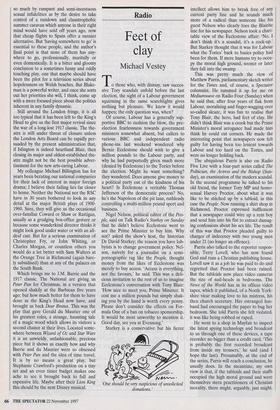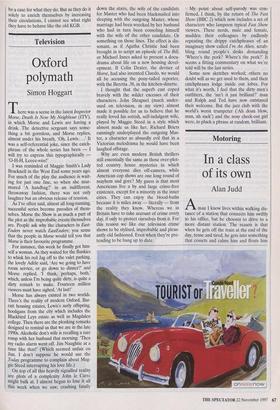Radio
Feet of clay
Michael Vestey
To those who, with dismay, saw succes- sive Tory scandals unfold before the last election, the sight of a Labour government squirming in the same searchlights gives nothing but pleasure. We knew it would happen; the only question was, when?
Of course, Labour has a generally sup- portive BBC to cushion the blow, the pre- election fearlessness towards government ministers somewhat absent, but callers to various BBC and independent radio phone-ins last weekend wondered why Bernie Ecclestone should wish to give a million pounds to the Labour party, and why he had purportedly given much more (denied by Ecclestone) to the Tories before the election. Might he want something? they wondered. Does anyone give money to a political party out of the kindness of his heart? Is Ecclestone a veritable Thomas Jefferson of the democratic process? No, he's the Napoleon of the pit lane, ruthlessly controlling a multi-million pound sport and business.
Nigel Nelson, political editor of the Peo- ple, said on Talk Radio's Starkey on Sunday that he didn't believe Ecclestone went to see the Prime Minister to buy him. Why not? asked the show's host, the historian Dr David Starkey; the reason you have lob- byists is to change government policy. Nel- son, naively for a journalist on a semi- pornographic rag like the People, thought money from the likes of Ecclestone was merely to buy access. 'Access is everything, not the favours,' he said. This was a deli- cious invitation to the rest of us to imagine Ecclestone's conversation with Tony Blair: `How nice to meet you, Prime Minister. It cost me a million pounds but simply shak- ing you by the hand is worth every penny. Please don't consider the effects on For- mula One of a ban on tobacco sponsorship. It would be most unworthy to mention it. Good day, see you at Evensong.'
Starkey is a conservative but his fierce `One should be very suspicious of unsolicited donations.' Intellect allows him to break free of any current party line and he sounds much more of a radical than someone like his guest Nelson who clearly toes the Blairite line for his newspaper. Nelson took a chari- table view of the Ecclestone affair: 'No, I don't think it's a scandal, it's a cock-up.' But Starkey thought that it was for Labour what the Tories' back to basics policy had been for them. If mere humans try to occu- py the moral high ground, sooner or later they fall into the swamp.
This was pretty much the view of Matthew Parris, parliamentary sketch writer for the Times and, of course, a Spectator columnist. He summed it up for me on Mediumwave on Radio Four (Sunday) when he said that, after four years of flak from Labour, moralising and finger-wagging over so-called sleaze, it was fun to realise that Tony Blair, the hero, had feet of clay. He didn't think Blair was a crook but the Prime Minister's moral arrogance had made him think he could cut corners. He made the interesting point that newspapers now felt guilty for having been too lenient towards Labour and too hard on the Tories, and were no longer holding back.
The ubiquitous Parris is also on Radio Five Live with a four-part series called The Politician, the Actress and the Bishop (Sun- day), an examination of the modern scandal. In the second programme he talked to his old friend, the former Tory MP and homo- sexual Harvey Proctor, about what it was like to be stitched up by a tabloid, in this case the People. Now running a shirt shop in Richmond, Proctor expressed bafflement that a newspaper could wire up a rent boy and send him into his flat to extract damag- ing confessions about his sex life. The result of this was that Proctor pleaded guilty to charges of indecency with two young men under 21 (no longer an offence).
Parris also talked to the reporter respon- sible, Terry Lovell, who has now found God and runs a Christian publishing house. Lovell saw it as a job he was paid to do and regretted that Proctor had been ruined. But the tabloids now place video cameras the size of nail-heads in bedrooms. The News of the World has in its offices video tapes, which it published, of a North York- shire vicar making love to his mistress, his then church secretary. Her estranged hus- band had encouraged the paper to bug her bedroom. She told Parris she felt violated, it was like being robbed or raped.
He went to a shop in Mayfair to inspect the latest spying technology and broadcast to us through one of these devices, a tape recorder no bigger than a credit card. 'This is probably the first recorded broadcast from inside my trousers,' he said (and I hope the last). Presumably, at the end of the series, Parris will reach a conclusion, he usually does. In the meantime, my own view is that, if the tabloids and their staffs occupied the high moral ground and were themselves stern practitioners of Christian morality, there might, arguably, just might, be a case for what they do. But as they do it solely to enrich themselves by increasing their circulations, I cannot see what right they have to behave like the old KGB.



















































































 Previous page
Previous page